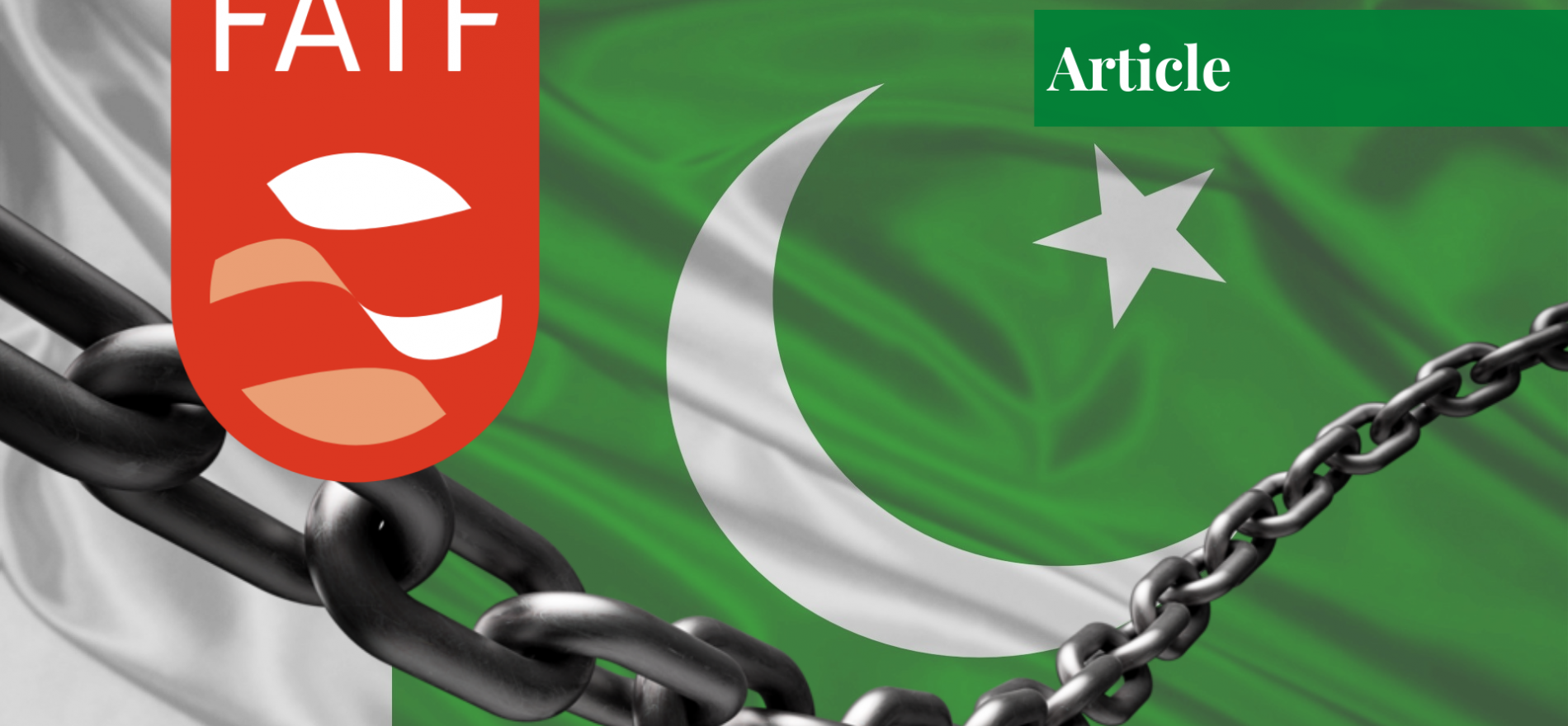Mr Muhammad Hamza Tanvir is an independent journalist and a political analyst, focusing primarily on regional and global strategic and political issues. He has authored numerous articles for different national and international publications.
Pakistan has once again been placed on the grey list of the Financial Action Task Force (FATF), the Paris-based watchdog, failing to satisfy it with regards to the actions it is taking against terror financing and money laundering. The President of the FATF, Dr. Marcus Pleyer, announced that while Pakistan has made significant progress, it will still be kept on the ‘‘grey’’ list till June 2021.
He further stated that three tasks were yet to be completed – and would need to be completed by June 2021 for a successful review. As per some reports, China pulled its support from Pakistan as a result of a negotiation between China and India. Losing vital support in a time of need showcased the weakness in the alliance between Pakistan and China.
Turkey was the only country in the 39-member FATF that backed Pakistan and has pushed for Pakistan to be taken off the list. The lack of support from the traditional supporters of Pakistan –China, Saudi Arabia, and Malaysia – caused Turkey’s proposal to drop. The absence of assistance from China put the country in hot water and has raised many questions about Pakistan’s reliance on China.
Dr. Marcus Pleyer reiterated that Pakistan needed to eradicate terror financing, and strongly urged the country to complete the remaining three points (out of the 27-point action plan). The organization had previously expressed serious concerns over the country’s failure to meet the given action plan on time (and in the light of the risk of terror financing) in February 2021.
A Preamble to FATF
FATF is the global terror financing and money laundering watchdog which was established during the G-7 summit in Paris in 1989. This inter-governmental body consists of 39 member countries. It was created by the heads of G-7 countries and the President of the European Commission to curb the threats to the international banking system, and to the global financial institutions.
The organization expanded its mandate to include efforts to counter-terror financing (in addition to money laundering) in October 2001. The main aim of the FATF is to nurture effective implementation of legal, regulatory, and operational measures to end terror financing, money laundering, and other related perils. Indonesia is the sole observer country of the watchdog right now.
The FATF Grey List
The countries that do not have effective measures to combat money laundering and terror financing are placed on a ‘‘grey’’ list by the watchdog. The addition to FATF’s grey list is a warning: if the country does not take strict measures, it could be blacklisted. The countries currently on the FATF grey list are:
- Albania
- Barbados
- Botswana
- Burkina Faso
- Cambodia
- Cayman Islands
- Ghana
- Jamaica
- Mauritius
- Morocco
- Myanmar
- Nicaragua
- Pakistan
- Panama
- Senegal
- Syria
- Uganda
- Yemen
- Zimbabwe
The FATF Black List
The countries that are considered non-cooperative by the international watchdog are blacklisted. Such states are known as High-Risk Jurisdictions subject to a Call for Action. At present, the Democratic People’s Republic of Korea and Iran are currently blacklisted by the FATF. The blacklisted countries encounter extreme economic sanctions and other such measures by the member states of the FATF and other international organizations.
Pakistan’s History with the FATF’s Grey List
Pakistan has been on the grey list before. In 2008, the country was greylisted for the first time. The main concern of the organization at that time was that Pakistan did not have appropriate legislation to identify terrorist financing and to confiscate terrorist assets. Pakistan was greylisted again in 2012 for failing to effectively combat money laundering and terrorist financing. However, the country succeeded to clear its name from the FATF’s grey list in 2015.
In 2018, the country was put on the grey list again because of a campaign by the United States and the European Nations to make the country do more against money laundering and terrorist financing. The accusations of India and the United States caused the country to fall into the grey list. They allegedly accused Pakistan to assist Lashkar e Jhangwi, Jamaat ud Dawah, Lashkar e Taiba, and other Al-Qaeda-related terrorist groups.
Pakistan, however, is trying its best to get its name whitelisted. The country has arrested countless terrorists and implemented numerous measures to battle terrorism. This time, the country was given 40 recommendations along with a 27-point action plan. Out of these 27-points, Pakistan successfully completed 24 of the 27 points assigned to it in a short period.
The Federal Minister for Industries and Production, Hamad Azhar, following the FATF’s development, tweeted that the country had completed almost 90% of its current FATF plan. The Minister also tweeted that the country is perhaps subject to the most challenging and comprehensive action ever given to any country.
The questions that arise now are:
- Why India is not on greylisted by the watchdog despite clear shreds of evidence of Human rights violations in Kashmir?
- Why has the FATF not given the same 27-point action plan to India even after the evidence of terror financing to DAESH by the Indian state?
- Why has the organization not highlighted or discussed the case of India spying in the sovereign territories of Pakistan through Kalbhushan Yadav?
- Why has India’s terror financing of TTP been ignored by the FATF?
A Pakistani journalist Adeela khan asked the President of the FATF these questions. Senator Rehman Malik also asked him similar questions, and he replied that India’s money laundering and terror financing did not fall within the domain of FATF – but then one wonders why similar cases in Pakistan fall under the FATF’s domain.
The recommendations given by FATF are binding on Pakistan because they were linked to the allocation of IMF loans for the country. The discriminatory behavior of the FATF against Pakistan raises a serious question about the watchdog’s credibility. Prime Minister of Pakistan, Imran Khan, while addressing the High-Level Panel on International Financial Accountability, Transparency, and Integrity for Achieving 2030 Development Agenda also raised the question on the transparency and integrity of the organization.
He discussed how international organizations dealing with tax matters and illicit financing should not be used as instruments to pressurize developing countries. Reports say that the United States, France, and India have lobbied against Pakistan to ensure that the country does not get whitelisted.
The reports claim that the United States has serious concerns over the acquittal of the accused Ahmed Omar Saeed Sheikh in the American journalist Daniel Pearl’s kidnapping and murder case. The Pakistan government signed an accord with Tehreek e Labbaik (TLP) about ending diplomatic ties with France, assuring the leaders of TLP that the government will fulfill the agreement after being whitelisted by FATF (as claimed by some senior journalists).
The FATF and the United States are blatantly ignoring the diligent efforts of Pakistan, alongside the severe economic and human losses it has faced during the long war against terror. Although there are grave concerns surrounding the ‘‘fairness’’ of FATF, the withdrawal of support by Pakistan’s staunch foreign allies China and Saudi Arabia was a major setback. Some have even called this a sheer diplomatic failure.
Consequences of Being Blacklisted
According to research by the Islamabad-based research advisory Tabadlab, Pakistan has suffered a loss of around $38 billion because of the greylisting. The country would face extreme economic sanctions if it were to get blacklisted. There will be an absolute decline in foreign direct investment in Pakistan. International banks (such as Standard Chartered) will halt their activities in the country.
Pakistan, being on the blacklist, could have a grave impact on the country’s imports and exports, its remittances, and the ability to borrow money from international lenders, such as IMF and Asian Development Bank. Pakistan’s economy will suffer, and it will be strenuous for the country to meet its mounting financial needs.
Industries that rely on online payment systems and online money transfers withdraw their investments from the country. If the country cannot get itself whitelisted, it will be harder to attract foreign investors. Being grey listed is an appalling impediment for the country’s business climate and the growth of its e-commerce and digital sector – but being blacklisted will be much, much worse.
Options for the Government
The efforts of the government to get the country whitelisted are commendable, but they still have a long way to go. The sad reality is that some countries – the United States, India, & France – are actively trying and lobbying to keep Pakistan on the greylist. However, the lack of support from Saudi Arabia, Malaysia, the Gulf States, the all-weather friend China, and other Gulf countries may be a failure of the country’s diplomacy.
To ensure that Pakistan is removed from the greylist, Pakistan needs to plug the loopholes in its financial systems. Moreover, the country also needs to revisit its foreign policy, given that it only had Turkey’s support in the face of such dire circumstances. Further strengthening the budding Pakistan-Russia-China bloc could be helpful in future discussions around Pakistan’s efforts to remove itself from the grey list. Implementing the action plan of the FATF in its true spirit will not only assist Pakistan to get whitelisted but will also enhance the country’s ability to keep track of its undocumented economy which will then hamper the terrorists from getting financial aid from within the country.
This will also earn the country a colossal sum of money in the form of taxes as more and more financial transactions will be documented and handled through legal means. What Pakistan has to do is to regain the confidence of its former allies – and refrain from choosing sides in case of tensions between its allies.
It has to take pragmatic steps to satisfy FATF and to attract foreign investment to ultimately help curb inflation, poverty, and terrorism. Pakistan getting itself whitelisted will be its greatest success against its foes. As the famous Chinese military strategist, Sun Tzu, in The Art of War, says, “the supreme art of war is to subdue the enemy without fighting”.
If you want to submit your articles and/or research papers, please check the Submissions page.
The views and opinions expressed in this article/paper are the author’s own and do not necessarily reflect the editorial position of Paradigm Shift.



















